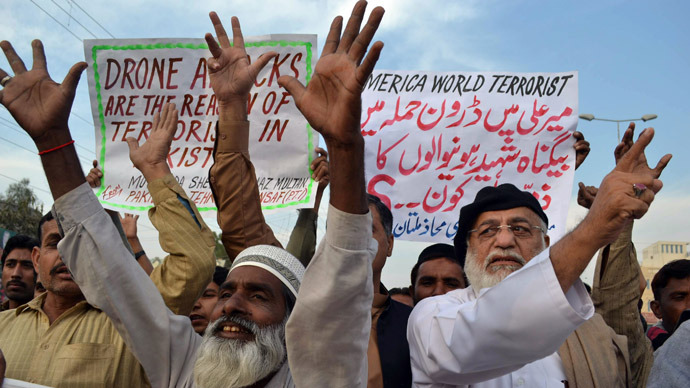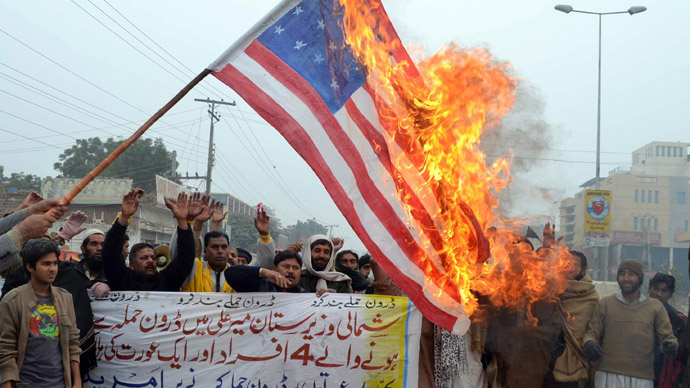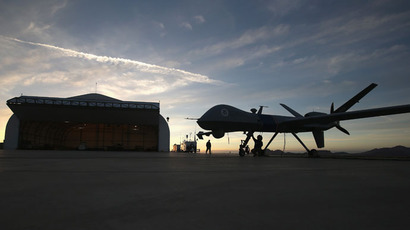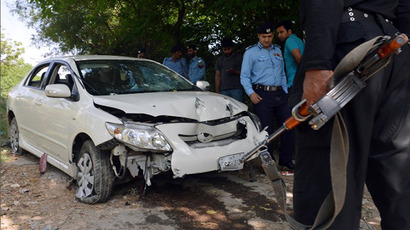US drone strikes illegal, govt should stop them – Pakistani court

A high court in Pakistan has ruled that US drone strikes in the country's tribal belt should be considered war crimes and directed the government to use force to "protect the right to life" of its citizens.
The Peshawar High Court has recommended the Pakistani government
advance a resolution against the attacks in the United Nations. The
court issued its verdict on the CIA-run air strikes in response to
four petitions charging the attacks killed civilians and caused
“collateral damage.”
Chief Justice Dost Muhammad Khan heard the petitions, and ruled
that drone strikes on sovereign Pakistani territory were illegal,
inhumane and a violation of the UN charter on human rights.
“The government of Pakistan must ensure that no drone strike
takes place in the future,” the court said on Thursday,
according to the Press Trust of India. Khan also asked Pakistan's
foreign ministry to file a resolution against the attacks in the
UN.
The court also recommended that if the US rejects these findings in the UN, Pakistan should break off relations with Washington: “If the US vetoes the resolution, then the country should think about breaking diplomatic ties with the US.”

The Pakistani case was filed last year by the
Foundation for Fundamental Rights, a charity based in Islamabad, on
behalf of the families of victims killed in a drone attack on a
tribal jirga, including more than 50 tribal elders and a number of
government officials.
According to a report submitted by political officials of North Waziristan Agency, 896 Pakistani residents of the region were killed in the last five years ending December 2012, and 209 were seriously injured. A report by the South Waziristan Agency showed that 70 drone strikes were carried out in the last five years ending June 2012, in which 553 people were killed and 126 injured.
"In view of the established facts, undeniable in nature, under the UN Charter and Conventions, the people of Pakistan have every right to ask the security forces either to prevent such strikes by force or to shoot down intruding drones," the court verdict said.
Shahzad Akbar, a lawyer for victims in the case, hailed this as a “landmark” judgment: “Drone victims in Waziristan will now get some justice after a long wait. This judgment will also prove to be a test for the new government: If drone strikes continue and the government fails to act, it will run the risk of contempt of court,” he said, according to the website of legal action charity Reprieve.
Killing terrorists, breeding enemies
The United States regularly targets Al-Qaeda and Taliban
militants in Pakistan's mountainous tribal regions accused of
carrying out cross-border attacks in Afghanistan. Washington claims
the operations are done in cooperation with Pakistan's
military.
Human rights groups, however, criticize the “collateral damage”
of innocent civilian deaths caused by the attacks, and point to the
shroud of secrecy surrounding drone use.
“Drone attacks on northwest Pakistan, which commenced under
former US President George W. Bush in 2004, have increased
sevenfold under Obama and has caused the deaths of thousands of
suspected terrorists and at least hundreds of civilians in Pakistan
and Yemen,” Bloomberg reported in April.
Even some of America’s leading commanders fear blowback over the
indiscriminate use of this new military technology.
“The resentment created” by Washington’s newfound
reliance on drone strikes “is much greater than the average
American appreciates,” General Stanley McChrystal, the former
top commander in Afghanistan, told Reuters in January. The use of
drones adds to “the perception of American arrogance that says,
‘We can fly where we want, we can shoot where we want, because we
can.”’
At the same time, America’s foreign critics seem to be gaining
ground as Washington continues to pursue drone warfare.
Former Pakistani Prime Minister Nawaz Sharif, whose Pakistan
Muslim League (PML-N) party is considered the favorite in this
Saturday's election, recently vowed that he would not permit drone
attacks on Pakistani soil.
“Drone attacks are against the national sovereignty and a
challenge for the country's autonomy and independence,” he
said.
Clive Stafford Smith of the London-based group Reprieve said the
court’s ruling is a step toward greater transparency in
Washington’s use of drone technology: “Today's momentous
decision by the Peshawar High Court shines the first rays of
accountability onto the CIA's secret drone war,” the
Independent quoted him as saying.
The innocent people killed by American drone strikes are
civilian victims of US war crimes, he added.














